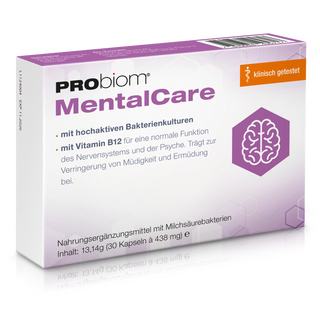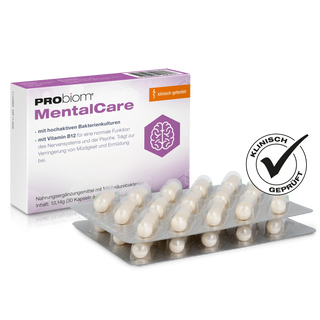In recent years, science has gathered increasing evidence that our gut is far more than just a digestive organ. It's a complex ecosystem home to trillions of microorganisms – the so-called gut microbiome . And what surprises many: These tiny roommates could have a decisive influence on our mental health . But how exactly is our gut feeling connected to our state of mind?
What is the gut microbiome?
The gut microbiome encompasses all microorganisms—including bacteria, viruses, fungi, and archaea—that live in our digestive tract. The composition of this microbiome varies from individual to individual and is influenced by many factors, such as:
-
Nutrition
-
lifestyle
-
Environment
-
Taking medication (especially antibiotics)
-
Type of birth (caesarean section or natural birth)
-
Breastfeeding or bottle feeding
A balanced microbiome not only supports digestion and the immune system, but also communicates with our brain – via a so-called gut-brain axis .
The gut-brain axis: communication between the gut and the head
The gut-brain axis is a bidirectional communication system between the central nervous system (CNS) and the enteric nervous system (ENS), which controls the gastrointestinal tract. This communication occurs in several ways:
Neural: Via the vagus nerve, which transmits signals between the gut and the brain.
Hormonal: Intestinal bacteria produce neurotransmitters such as serotonin, dopamine and GABA.
Immunological: By influencing inflammatory processes and cytokines.
Interestingly, around 90% of the body’s serotonin , an important “happiness hormone,” is produced in the intestine.
How can dysbiosis (disorder of the microbiome) affect the psyche?
Dysbiosis refers to an imbalance in the microbiome —e.g., due to reduced biodiversity or a predominance of harmful bacteria. This imbalance can have various consequences for mental health:
-
Increased tendency to inflammation: A disrupted intestinal barrier can lead to inflammatory substances entering the bloodstream – so-called “low-grade inflammation,” which is associated with depression and anxiety.
-
Altered neurotransmitter production: Certain bacteria are involved in the production of mood-regulating neurotransmitters. Dysbiosis can disrupt this process.
-
Disruption of the stress system (HPA axis): Studies show that an unbalanced microbiome can overactivate the body's stress response system (hypothalamic-pituitary-adrenal axis).
What does research say?
Numerous studies on animals and humans provide evidence of the connection between the intestinal microbiome and psyche:
-
Animal studies show that mice raised in a germ-free environment – i.e. without intestinal bacteria – react more anxiously and stressed than their counterparts with a normal microbiome.
-
Human studies found differences in the intestinal flora of people with depression, anxiety disorders or autism compared to healthy control groups.
-
Probiotic studies show that certain “psychobiotic” bacterial strains (e.g. Lactobacillus helveticus or Bifidobacterium longum ) can have positive effects on stress, anxiety and depressive symptoms.
What can you do for your gut-brain health?
If you want to improve your mental health and do something good for your gut at the same time, the following measures can be helpful:
High-fiber diet: Vegetables, legumes, whole grains, and fruit promote beneficial bacteria.
Fermented foods: Sauerkraut, yogurt, kefir and kimchi provide live cultures.
Avoid unnecessary antibiotics: These can cause lasting damage to the microbiome.
Exercise and sleep: Physical activity and healthy sleep also promote a stable intestinal flora.
Stress reduction: Meditation, breathing exercises or yoga have a positive effect on both the psyche and the intestines.
Targeted intake of probiotics: Best after consulting a specialist.
Conclusion
Yes – science suggests that a disruption of the gut microbiome can indeed impact your mental health. The close connection between the gut and the brain – via nerves, hormones, and the immune system – makes the gut a key player in matters of mental balance. Therefore, anyone who wants to take a holistic approach to their mental health should not ignore the condition of their gut.













